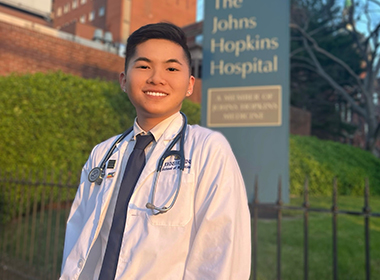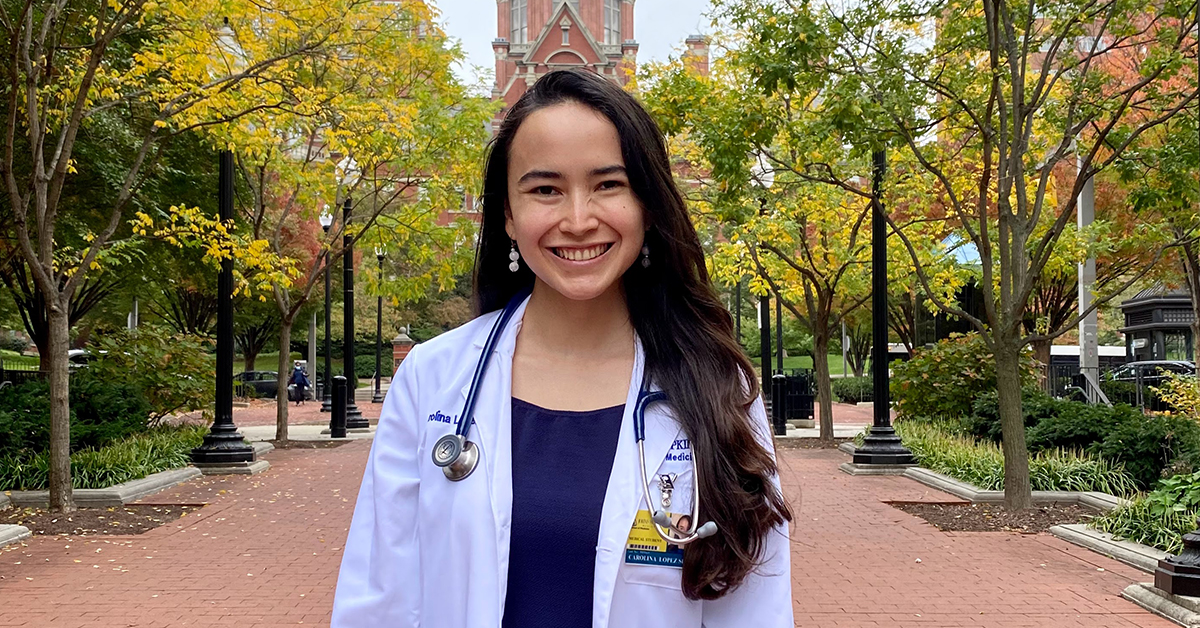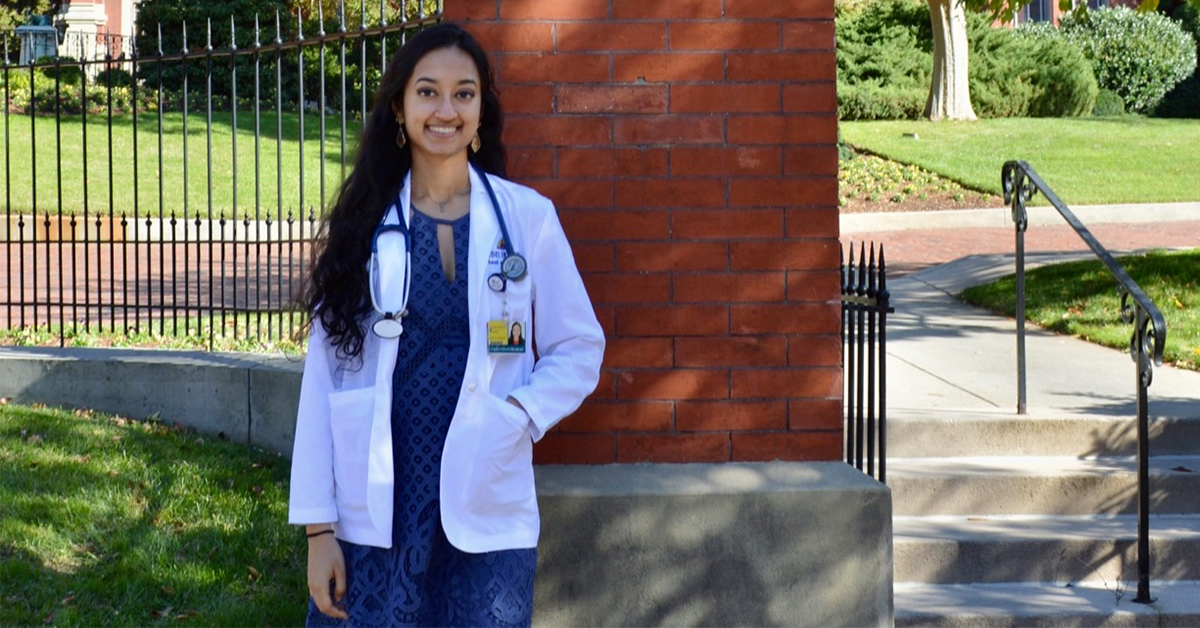Johns Hopkins University School of Medicine student Andy Lancaster is passionate about community engagement. That dedication helped him earn the individual medical student 2022 Community Service Award from SOURCE, the community engagement and service-learning center for the Johns Hopkins University schools of medicine and nursing and the Bloomberg School of Public Health.
“I think it’s impossible to truly serve your community without knowing who is in that community,” says Lancaster, who is starting his third year of medical school this fall. “You must meet people and understand who they are and how they live outside the doctor’s office/hospital environment. I believe it’s a responsibility of a medical professional to be meaningfully involved in the community in which they work. I feel that it’s an invaluable part of medical training.”
Lancaster, a Virginia native, and Jenny Chiang, D.O., a Johns Hopkins physical medicine and rehabilitation chief resident, and Mohammed Emam, M.D., sports medicine fellowship director, founded a student group that plugs medical trainees into local adaptive sports programs. They created the group from their newly developed sports medicine division in the physical medicine and rehabilitation department, during Lancaster’s first year of medical school. Adaptive sports are competitive or recreational activities for people with disabilities. With adaptive equipment, people of all abilities can participate in sports such as swimming, skiing, track and field, sled hockey, soccer, baseball, and wheelchair basketball, wheelchair tennis, wheelchair lacrosse, wheelchair softball, standup soccer, standup basketball and standup baseball.
The student group works with adaptive sports organizations such as the Kennedy Krieger Institute’s Bennett Blazers in Baltimore and the Two Top Mountain Adaptive Sports Foundation at Whitetail Resort ski facility in Mercersburg, Pennsylvania. Soon, the group will also partner with Maryland Therapeutic Riding in Crownsville and the Special Olympics of Maryland. Lancaster says the student group aims to raise awareness of sports opportunities for people with disabilities and to coordinate student volunteer efforts with organizations.
Lancaster, who Chiang describes as reliable, organized and great at connecting students with opportunities and helping them become more involved, says working with the student group is “incredibly rewarding.”
“You adapt the sport to the athlete, so that the sports are more accessible,” he says. “We’ve heard from athletes that participation in sport and engagement with others in the disabled community is powerful and meaningful for them. I’ve been told that many athletes have found sports to be therapeutic, and participating has contributed positively to their mental and physical health. It’s awesome to witness and an honor to be a part of!
“I feel that adaptive sports can offer a truly unique and powerful rehabilitative impact, and the need for interested, engaged, socially conscious, enthusiastic volunteers is high. There are a lot of amazing opportunities to work with this community of talented and motivated athletes and organizations dedicated to providing adaptive sporting opportunities. I think involvement in these programs can benefit any future or current medical trainee or other persons in health care.”
Lancaster stresses that he is not a member of the disabled community and in no way intends to speak on its behalf. An advocate for disability rights and awareness, he tries to learn how to serve in this role better.
“I have found a lot of meaning and personal fulfillment in working with these programs and in these spaces, but I want to ensure that my voice is not raised above theirs,” Lancaster says.
Lancaster says getting the student group started was a struggle during the COVID-19 pandemic. Eight new medical students have joined the leadership for the group, and he hopes it will become a long-standing organization at the school of medicine.
Exercise is medicine, says Chiang, and it helps prevent chronic diseases and medical complications.
“Exercise doesn’t just improve your physical health,” she says. “It also improves your mental health and overall fosters a better quality of life. Humans are resilient. They have so much potential when you give them equity.”
“When kids are starting out, you need extra hands,” says Gerard Herman. He and Gwena Herman are directors of the Bennett Institute Physically Challenged Sports Program at Kennedy Krieger. “For example, in the tennis program, we needed people to pick up balls and toss balls. The Johns Hopkins group helps us with that. They are motivated and bring a lot of enthusiasm to the program.”
“Disabled athletes get the same joy as nondisabled athletes,” adds Gwena Herman. “It’s just a matter of opportunity. You can try a sport and see if you like it.”
Stacey Schmader, co-founder of the Two Top Mountain Adaptive Sports Foundation, says participants in the program love Lancaster.
“Andy is a snowboarder, and he’s been helping to teach some snowboarding lessons,” she says. “Our students are always excited to see him. He’s easy to get to know and so friendly. That helps to reassure the students. He’s also confident, which helps because students can be a bit afraid. He always makes the students feel comfortable.”
Schmader says her program teaches to never say “no” or “can’t.”
“Anything is possible,” she says. “Our goal is to teach our athletes how to become independent skiers and snowboarders. This is all about healing for everyone, and that people can still do something fun with their families. It’s a lot of fun to watch people have smiles on their faces and want to come back.”
Lancaster is also passionately involved with the HEAT (Health Education and Training) Corps, a multigroup project spanning The Johns Hopkins University and Johns Hopkins Medicine. Lancaster was recruited as a HEAT Corps volunteer through SOURCE, where he teaches virtual COVID-19 lessons in schools all across the country.
“It has been incredibly meaningful to do,” he says. “Virtually, you can reach a wide audience.”
SOURCE founder and director Mindi Levin says Lancaster is one of the most committed HEAT Corps volunteers.
“Andy is a skilled educator, who has taught the HEAT Corps COVID-19 curriculum to numerous K–12 classrooms,” Levin says. “Andy also facilitated a crucial session for Baltimore City Public Schools teachers and administrators to introduce them to the program.”
Panagis Galiatsatos, M.D., M.H.S, an assistant professor in the Johns Hopkins pulmonary and critical care medicine division and health equity lead for the Johns Hopkins Office of Diversity, Inclusion and Health Equity, says Lancaster has efficiently delivered critical information to Baltimore youth.
“Using the pandemic’s known science, Andy was able to increase the science literacy overall of the students he taught,” Galiatsatos says. “By going over cause and effect versus correlation to vaccine timelines and education, Andy was able to reach the students and helped reaffirm medicine as a public trust. Andy also teaches science in a way that’s actionable to the students. As a result, each student Andy taught feels empowered to aid in helping end the pandemic.”
Lancaster encourages anyone interested in volunteering with adaptive sports to get involved.
“You don’t have to have any exceptional skills or any experience with adaptive sports or sports in general,” he says. “You just need to be committed, interested and consistent. There are lots of opportunities, and it’s so rewarding.”



